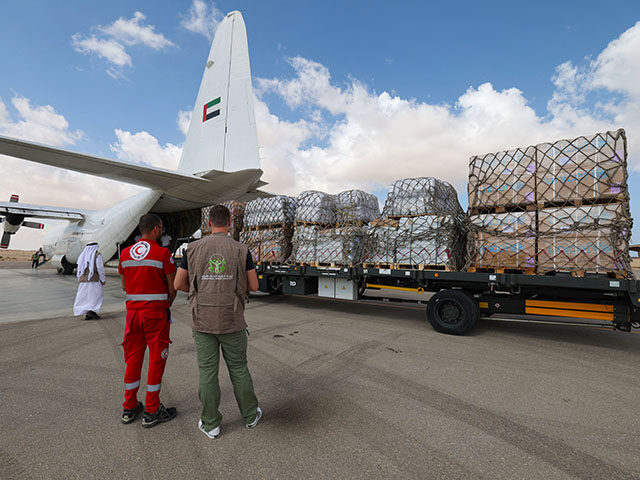Col. Elad Goren, Head of Israel’s Civil Department of the Coordination of Government Activities in the Territories (COGAT), told reporters Friday that the humanitarian situation in Gaza Strip had “stabilized,” and that there was enough food entering the area.
Goren addressed reporters in the wake of concerns expressed in the media about the possibility of “famine” in Gaza as a result of the conflict between Israel and Hamas, which started with a Hamas terror attack in Israel on October 7 that killed 1,200 people.
Before the war, he said, there was an average of “70 trucks carrying food entering Gaza every day. The average this week was 109 trucks.” He said that the trucks were providing, for example, 2 million loaves of pita bread every day. Overall, he said, over 126,000 tons of aid had entered Gaza, delivered on over 7,100 trucks.
In addition, he said, five field hospitals had been established, concentrated in the southwesters part of the Gaza Strip, and incubators and vaccines had been provided from Israel, as well as medical evacuation to other countries, where necessary for emergency or specialized treatment.
COGAT had, he said, made connections between UN humanitarian agencies and the owners of trucks in Gaza that deliver aid. Israel was also working to develop additional storage facilities for aid, and to built more shelter for civilians in the Al-Mawasi area, the “safe” zone established by Israel in southwestern Gaza in the early weeks of the war.
Goren said that despite voices saying that there needed to be more aid delivered to Gaza, “there is a sufficient amount of food in Gaza, and we continue to push the humanitarian agencies to collect more trucks and to distribute them.”
The bottlenecks were not on the Israeli side, he argued. “Israel has not, and will not, stand in the way of providing humanitarian aid to the people that are not part of terror.”
Rather, there needed to be improved distribution of aid. He said, for example, that there was a “desperate” need for a QR code system to monitor the progress of aid within Gaza, and said that international organizations had told Israel that they do not have the ability “to receive the aid” that had been processed at crossing points into Gaza, partly due to a lack of staff.
“The organizations desperately need to increase their capabilities,” Goren said. “Even if the amount of aid sent [is] doubled, it is no use if the organizations don’t have the ability to receive and distribute it.”
Joel B. Pollak is Senior Editor-at-Large at Breitbart News and the host of Breitbart News Sunday on Sirius XM Patriot on Sunday evenings from 7 p.m. to 10 p.m. ET (4 p.m. to 7 p.m. PT). He is the author of the 2021 e-book, “The Zionist Conspiracy (and how to join it),” now updated with a new foreword. He is also the author of the recent e-book, Neither Free nor Fair: The 2020 U.S. Presidential Election. He is a winner of the 2018 Robert Novak Journalism Alumni Fellowship. Follow him on Twitter at @joelpollak.

COMMENTS
Please let us know if you're having issues with commenting.